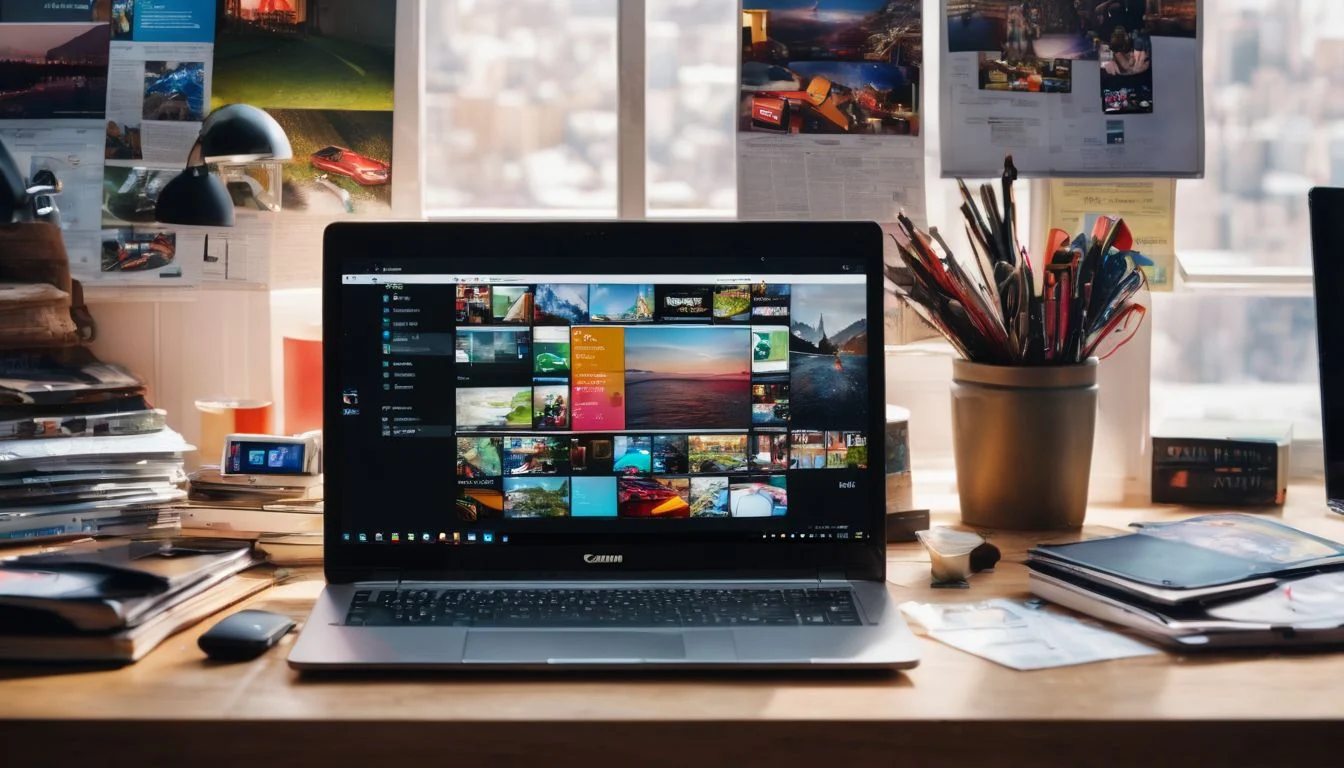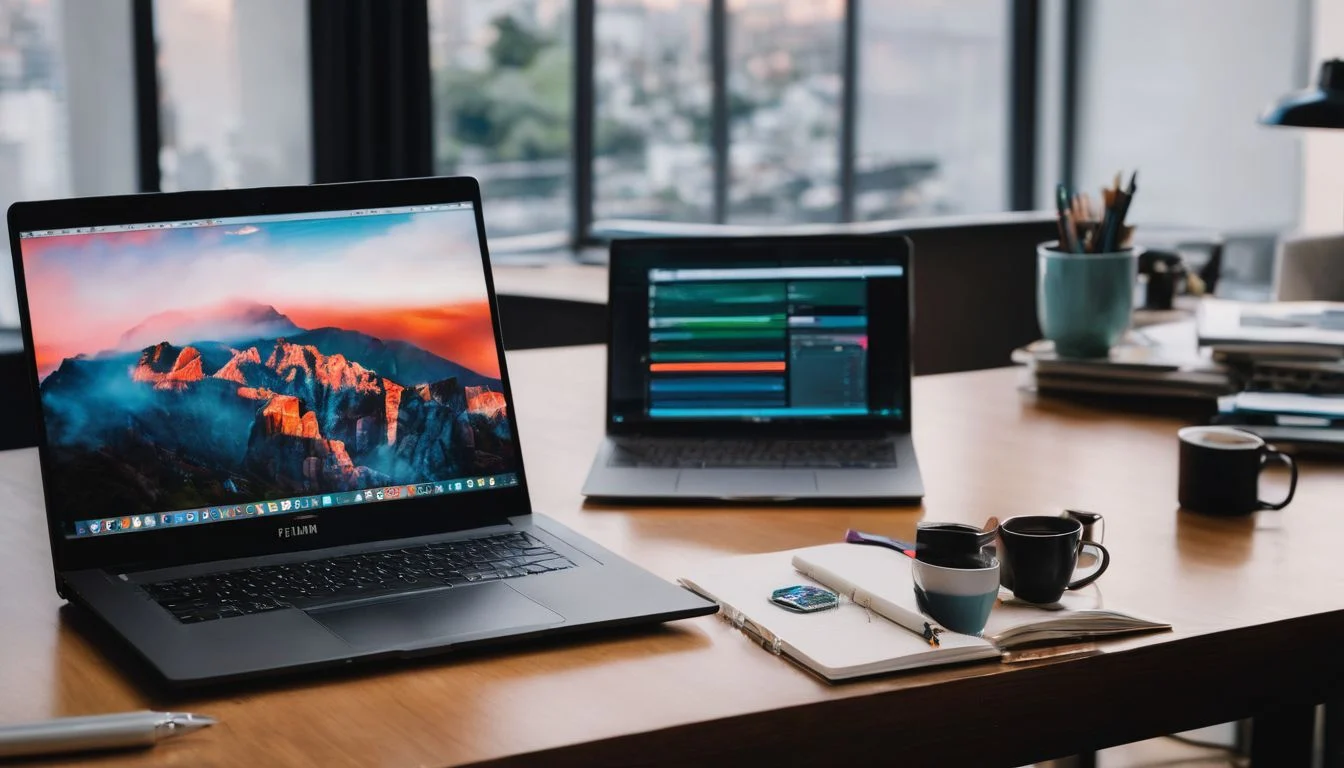Ready to upgrade your mobile life but feeling a bit stuck in the iPhone versus Android debate? It’s a choice many face, pondering whether to go with Apple’s sleek iOS or embrace the versatile world of Android.
You’re not alone if you’ve ever scratched your head trying to pick the team that’ll suit you best.
Here’s something interesting: while iPhones often lead when it comes to shooting videos, Android devices can compete neck-and-neck on photo quality. Whether you’re snapping selfies or capturing precious moments, this could be a game-changer for you.
This article is your personal guide through the jungle of features, prices and user experiences offered by both camps. We’ll help shed light on which phone could be your true tech companion.
Dive into our friendly duel below—it might just surprise you!
Key Takeaways
- iPhones operate in a closed system with strong video capabilities and regular updates, while Androids offer an open system ideal for customisation and varied designs.
- While iPhone focuses on premium design and user – friendly interfaces, Android devices provide more options for different budgets and personal tastes.
- Your choice between these platforms can affect how you use AI assistants, store data in the cloud, manage security, enjoy media content, and experience battery life.
Differences in Markets, Tech and Media
Apple’s closed ecosystem offers a more controlled and secure environment, while Android’s open ecosystem allows for greater customisation and flexibility. The availability of apps and features also varies between the two operating systems.
Apple’s closed ecosystem vs. Android’s open ecosystem
Apple has a system where everything works together in a special way. They make their own phones, software, and app store. This means they control what apps you can use and how your phone talks to other Apple devices like MacBooks.
It’s great for folks who love making videos because iPhones are good at that.
Android is different because it lets lots of companies use its system. You can find it on many brands of phones, and you have more choices for how your home screen looks. Since Android is from open source software, there’s a lot more room to change things around to suit what you want.
Now let’s consider the availability of apps and features on both platforms.
Availability of apps and features
Android and iPhone offer different app stores with their own set of advantages. Android’s open ecosystem allows for more app variety and customisation, while iPhone’s closed ecosystem focuses on quality control.
Both platforms have messaging and file-sharing options, but iMessage and Airdrop give iPhone users an edge over standard Android choices. When it comes to apps and features, both systems provide a range of options to cater to individual needs.
– User Experience and Preferences
User Experience and Preferences
When it comes to user experience and preferences, consider the ease of use, design, and aesthetics of both iPhone and Android. Additionally, think about the price range that suits your budget and lifestyle.
Ease of use
When considering the ease of use, Android offers a more customisable experience, making it suitable for users who prefer more control over their device. The ability to personalise home screens and choose default apps adds to the user-friendly nature of Android.
However, iPhone’s streamlined interface and seamless integration with other Apple devices make it attractive for those seeking a simpler and more cohesive user experience.
Android provides a high level of customisation and flexibility whereas iPhone offers a seamless integration with other Apple devices contributing to differing preferences based on individual needs and priorities.
Design and aesthetics
The design of the iPhone is sleek and stylish, with a simple yet elegant look that emphasises premium materials. The Android devices, on the other hand, offer a wider range of designs catering to different preferences and budgets.
They often feature larger screens and more varied shapes and sizes compared to the iPhone.
When it comes to aesthetics, iPhone tends to focus on consistency and minimalism while Android devices provide more opportunities for personalisation through widgets, themes, and custom launchers.
Price range
When considering the price range, it’s important to note that Android devices often offer a wider variety of options at different price points, making them more accessible to budget-conscious consumers.
On the other hand, iPhones are generally more expensive but provide a consistent and premium user experience across their product line. While Android devices cater to varying budgets and preferences, iPhone users typically expect a higher upfront cost for the brand’s quality and integration with other Apple products.
Ultimately, your decision between iPhone and Android may come down to how much you’re willing to invest in a smartphone and what features matter most to you.
Features and Capabilities
Discover the differences in AI and voice assistants, security measures, camera quality, battery life, and charging between iPhone and Android to determine which features are most important to you.
AI and voice assistants
AI and voice assistants play a significant role in the user experience of smartphones. Both iPhone and Android devices come with their own voice assistants, Siri for iPhone and Google Assistant for Android.
Siri is known for its integration with other Apple devices such as the MacBook, while Google Assistant excels in providing more contextual responses based on search history and personal preferences.
The competition between these two voice assistants continues to drive innovation, bringing new features and capabilities to users.
Voice assistants are becoming an integral part of smartphone technology, offering hands-free convenience for tasks like setting reminders, sending messages, or searching the web. As AI continues to advance, we can expect even more personalised interactions with our devices through these voice assistants.
Security measures
When it comes to security, both iPhone and Android have measures in place to keep your data safe. iPhone’s closed ecosystem and regular software updates make it less vulnerable to malware compared to Android.
Additionally, Apple’s Face ID and Touch ID offer secure ways to unlock the device and authenticate payments. On the other hand, Android provides flexibility with third-party app installations while encouraging users to be cautious about security threats.
Overall, both platforms prioritise user privacy and offer different approaches to ensure the safety of personal information.
Camera quality
When comparing the camera quality of iPhone and Android, it’s important to note that both have their strengths. The iPhone is renowned for its exceptional video recording capabilities.
On the other hand, some argue that Android devices often excel in capturing still photos. It’s essential to consider how you primarily use your smartphone camera – whether for videos or photography – when evaluating which option may be better suited for your needs.
Ultimately, when considering the camera quality between iPhone and Android, it comes down to individual preferences and specific requirements as each platform offers distinct advantages in this aspect.
Battery life and charging
When it comes to battery life and charging, Android devices are often praised for their longer battery life compared to iPhones. This is due to the wide range of Android phones available with different battery capacities, catering to various user needs and preferences.
Additionally, many Android devices support fast charging technology, allowing users to quickly recharge their phones when needed. On the other hand, while iPhones may not have as long a battery life as some Android phones, they are known for their efficient power management, ensuring that users can make the most of their device’s battery capacity without frequent recharging.
Ultimately, both iPhone and Android offer unique approaches to battery life and charging, accommodating diverse user requirements and usage patterns.
The Importance of Updates
Ensure your smartphone is always up-to-date with the latest features and security measures. Stay ahead of the game with timely updates, cloud integration, and a wide range of software choices.
Timely updates
Smartphone updates are crucial for fixing security issues and adding new features. Android phones often face delays in receiving updates, while iPhones receive regular and timely updates.
These updates not only keep the device secure but also bring new functionalities and improvements to the operating system. When considering a smartphone, these software update differences should be factored into your decision-making process.
– Cloud integration
Cloud integration
When considering the integration of cloud services, both iPhone and Android offer their own set of options. Apple’s iCloud delivers seamless synchronisation across Apple devices, making it easy to access photos, files, and backups.
On the other hand, Android provides flexible integration with Google Drive for storage and collaboration. These cloud solutions play a significant role in ensuring that your data is easily accessible from anywhere at any time.
Both iPhone and Android users can store their important files in the cloud; however, they have distinct platforms for doing so. iCloud offers features such as automatic backups and shared albums while Google Drive integrates seamlessly with various productivity apps like Docs and Sheets.
Software choices
When choosing between iPhone and Android, software choices play a crucial role. iOS offers a more streamlined and controlled experience with limited customisation options but emphasises user-friendly interface design.
On the other hand, Android provides greater flexibility and customisability, allowing users to personalise their devices extensively through third-party apps and system modifications.
This difference in approach reflects the varying preferences of users seeking simplicity and integration (iPhone) or those valuing control and customisation (Android). Therefore, your software choice depends on whether you prioritise user-friendliness or desire more control over your smartphone experience.
The Future of Smartphone Technology
Get ahead of the latest developments in smartphone technology, including the upcoming 5G network and other advancements. Stay informed about how competition between iPhone and Android is driving innovation in the mobile industry.
5G and beyond
The future of smartphone technology is rapidly advancing with the adoption of 5G and beyond. This next generation of mobile networks will bring faster speeds, lower latency, and greater connectivity, revolutionising how we use our devices.
With 5G, you can expect improved video streaming quality, seamless virtual reality experiences, and enhanced gaming capabilities on your iPhone or Android device. Beyond 5G, developments in mobile technology may include increased integration with AI for more personalised user experiences as well as advancements in augmented reality features for a more immersive digital world.
Advancements in mobile technology are also driving the rivalry and innovation between iPhone and Android manufacturers. Both Apple and Google are constantly pushing the boundaries to outdo each other with new features and capabilities.
Advancements in mobile technology
Mobile technology is constantly evolving, with both iPhone and Android devices embracing new features like 5G connectivity. This means faster internet speeds and improved capabilities for streaming, gaming, and other data-heavy activities.
Furthermore, developments in AI and voice assistants continue to enhance user experiences by providing more intuitive interactions with smartphones. The rivalry between Apple and Google also fuels innovation, pushing the boundaries of what mobile devices can achieve.
The impact of advancements in mobile technology extends beyond just hardware upgrades. With cloud integration becoming more seamless, users can access their data across multiple devices effortlessly.
The impact of rivalry and innovation
The rivalry between iPhone and Android has driven innovation in the smartphone industry. Each company competes to offer better features, leading to advancements in technology like AI and camera quality.
This competition also benefits users by providing a wider range of choices and pushing for continuous improvements in user experience.
Android’s open ecosystem encourages innovation from various manufacturers, resulting in a diverse array of devices to suit different preferences and budgets. On the other hand, Apple’s closed ecosystem drives innovation within its own products, often setting new standards that competitors strive to match or surpass.
Conclusion
In conclusion, comparing iPhone vs. Android has shown the diverse features and capabilities each offers. Your preferences and specific needs ultimately determine which is right for you.
The practical comparison highlights user control, interface preferences, and operating system updates. Understanding these differences helps in making an informed decision about your next smartphone.
Explore further resources to delve deeper into this ongoing debate and make the best choice for your mobile device needs. This comparison emphasises the importance of considering user experience, functionality, and compatibility when selecting a smartphone that suits you best.
FAQs
1. How do iPhones and Androids differ in user control?
iPhones have a simple user interface, whilst Android devices offer more customisation and control for users to change their settings and the look of their phones.
2. Which is more user-friendly, iPhone or Android?
Both iPhone and Android smartphones aim to be user-friendly but they take different approaches. The iPhone has an easy-to-use system that many people like, whereas Android offers more options for users who want to set things up their way.
3. Are app stores the same on iPhone and Android phones?
No, they are not the same. iPhones use Apple’s App Store, whilst Android devices use Google Play Store; each with its own set of apps which may affect your smartphone comparison.
4. Do I get better camera quality with an iPhone or an Android phone?
Camera quality can vary within both types of phones; however, some people prefer iPhone cameras for photo quality. In any mobile device option you choose, check out the camera specs!
5. How often do operating system updates happen on iPhones versus Androids?
Operating system updates come out regularly for both kinds of devices; however, iPhones typically receive updates at once worldwide due to compatibility across all models, whilst update availability may differ across various makes of Android devices.




